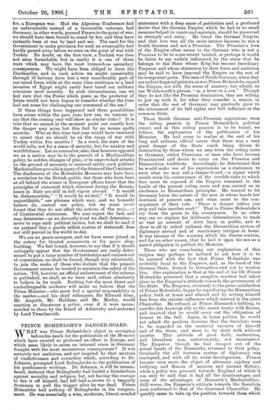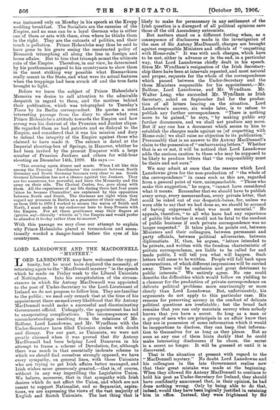PRINCE HOHENLOHE'S DANGER-BOARD.
WHAT was Prince Hohenlohe's object in arranging before his death for the publication of the Memoirs which have created so profound an effect in Europe, and which seem likely to cause an internal crisis in Germany fraught with the most momentous consequences ? It was certainly not malicious, and not inspired by that mixture of vindictiveness and cowardice which, according to Dr. Johnson, prompted Lord Bolingbroke to the publication of his posthumous writings. Dr. Johnson, it will be remem- bered, declared that Bolingbroke had loaded a blunderbuss against morality and religion, but, not having the courage to fire it off himself, had left half-a-crown to a beggarly Scotsman to pull the trigger after be was dead. Prince Hohenlohe had nothing of Bolingbroke in his tempera- ment. He was essentially a wise, moderate, liberal-minded statesman with a deep sense of patriotism and a profound desire that the German Empire, which he had in no small measure helped to create and maintain, should be preserved in strength and unity. He loved the German Empire, and that love was all the more intense because he was a South German and .not a Prussian. The Prussian's love of the Empire often seems to the German who is not a Prussian to be to some extent tainted, or perhaps it would be fairer to say unduly influenced, by the sense that he belongs to the State whose King has become hereditary Emperor, and whose statesmen by their force and ambition may be said to have imposed the Empire on the rest of its component parts. The men of South Germany, when theY are ardent Imperial patriots, as was Prince Hohenlohe, regard the Empire, not with the sense of mastery, but wholly, to use Wordsworth's phrase, "as a lover or a son." Though they do not like the Prussian domination, they are willing to put up with it, for what they consider a season, in order that the rest of Germany may gradually grow to the attainment of its full rights and full influence in the common State.
These South German anti-Prussian aspirations were the ruling passion in Prince Hohenlohe's political career, and in this ruling passion is to be found, we believe, the explanation of the publication of his Memoirs. He had come to realise at the end of his long and arduous official career that there was a very great danger of the State coach being driven to destruction by those whom we may term the ruling caste in Germany, either Prussians, or men who have become Prussianised and desire to carry on the Prussian and Bismarckian traditions. Accordingly, he determined that he would make use of his experiences as a statesman to erect what we may call a danger-board,—a signal which would warn his countrymen of the terrible risks to which they must be exposed if the Empire remained in the hands of the present ruling caste and was carried on in obedience to Bismarckian principles. He wanted to let Germany know the nature of the men in whose hands her destinies at present are, and what must be the con- sequences of their rule. 'There is danger unless you stop and take another road ! ' That is Prince Hohenlohe's cry from the grave to his countrymen. In no other way can we explain his deliberate determination to wash so vast an amount of dirty linen in public, and to show in all its naked ugliness the Bismarckian system of diplomacy abroad and of reactionary intrigue at home. It was because of the warning which his diaries contain, and for no other reason, that he laid it upon his son as a sacred obligation to publish his Memoirs.
Those who are considering our explanation of this enigma may perhaps be inclined to ask how it is to be squared with the fact that Prince Hohenlohe was evidently loyal to the Emperor, and, as the head of the German State, desired to strengthen and not to weaken him. Our explanation is that at the cud of his life Prince Hohenlohe perceived that a complete reaction had taken place in the Emperor's attitude towards the government of the State. The Emperor, obviously to the great satisfaction of Prince Hohenlohe, began by repudiating the Bismarckian policy, both at home and abroad, and by setting himself free from the sinister influences which centred in the great Chancellor. He refused, at Prince Bismarck's bidding, to sacrifice his Austrian ally to the secret treaty with Russia, and insisted that he would carry out the obligation of honour to the full. Again, in home politics he would not admit the perilous doctrine that the Socialists were to be regarded as the essential enemies of himself and of the State, and were to be dealt with without quarter. This attitude of good faith, moderation, and liberalism was, unfortunately, not maintained. The Emperor, though he had escaped out of the actual hands of the Bismarcks, returned to their policy. Gradually the old tortuous system of diplomacy was readopted, and with all its worst developments. France became once more the object of alternate cajolery and bullying, and Russia of anxious and sinister flattery, while a policy was pursued towards England of which it can only be said that it had all the disadvantages and none of the advantages of Bismarck's Machiavellism. Still worse, the Emperor's attitude towards the Socialists soon conformed to that of the dismissed Chancellor. He quickly came to take up the position towards them which was instanced only on Monday in his speech at the Krupp wedding breakfast. The Socialists are the enemies of the Empire, and no man can be a loyal German who is either one of them or acts with them, even where he thinks them in the right. They are the outcasts of politics, and their touch is pollution. Prince Hohenlohe may thus be said to have gone to his grave seeing the resurrected policy of Bismarck triumphing all along the line in foreign and home affairs. But to him that triumph meant the ultimate ruin of the Empire. Therefore, in our view, he determined by his posthumous appeal to his countrymen to show them in the most striking way possible what Bismarckism really meant in the State, and what were its actual features when the trappings had been struck off and the true facts brought to light.
Before we leave the subject of Prince Hohenlohe's Memoirs we desire to call attention to the admirable despatch in regard to them, and the motives behind their publication, which was telegraphed to Tuesday's Times by its Berlin correspondent. He quotes a most interesting passage from the diary to show what was Prince Hohenlohe's attitude towards the Empire and how strong was his distrust of the Prussian and Junker clique. He regarded them as bad patriots and as disloyal to the Empire, and considered that it was his mission and duty to defend the integrity of the Empire against those who claimed to have made it. The extract is dated at the Imperial shooting-box of Springe, in Hanover, whither he had been invited by the present Emperor with a large number of Prussian Junkers and others for wild-boar shooting on December 14th, 1898. He says :— "This evening again dinner and music. When I sit like this among the Prussian Excellencies' the contrast between North Germany and South Germany becomes very clear to me. South German Liberalism has not a chance against the Junkers. They are too numerous, too powerful, and have the Monarchy and the army on their side. The Clerical Centre, too, goes along with them. All the experiences of my life during these last four years [since he became Chancellor] are explained by this opposition between North and South. The Germans are right when they regard my presence in Berlin as a guarantee of their unity. Just as from 1866 to 1870 I worked to secure the union of South and North, I must make it my endeavour here to keep Prussia with the Empire. For all these gentlemen snap their fingers at (pfeilen au/—literally whistle at') the Empire and would prefer to abandon it to-day rather than to-morrow."
With this passage we may close our attempt to explain why Prince Hohenlohe placed so tremendous and sensa- tionally worded a danger-board before the eyes of his countrymen.















































 Previous page
Previous page